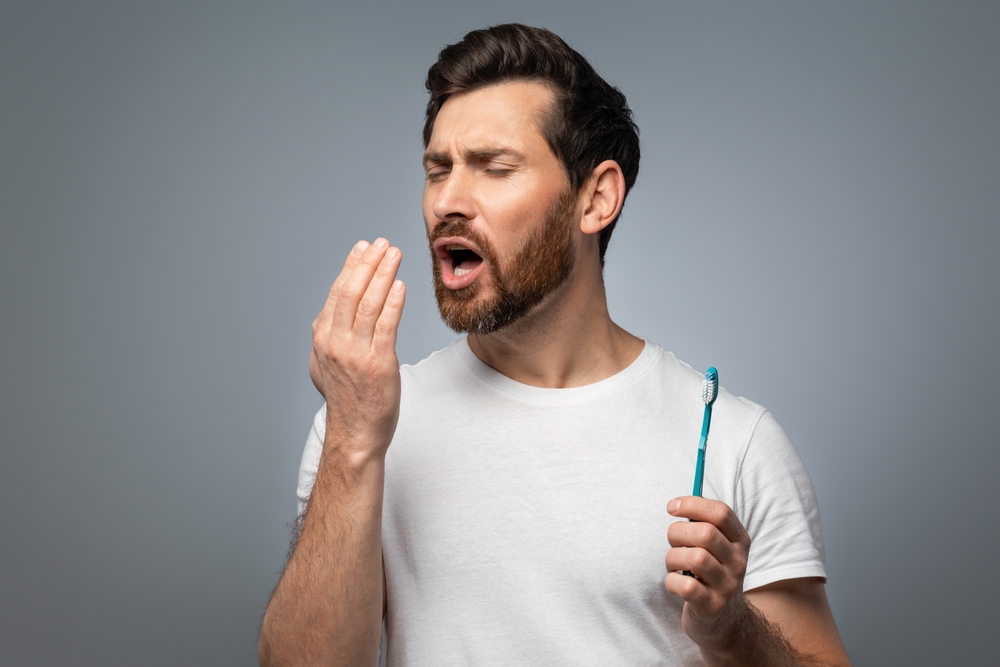Have you ever had a friend lean in to tell you a secret, and their breath smelled really bad? Or maybe you’ve been worried about your own breath smelling funny? Bad breath, or halitosis, can be embarrassing and unpleasant.
But don’t worry; there’s a simple solution that can help: dental cleaning near you. Let’s explore how cleaning your teeth can help keep your breath fresh and pleasant.
What Causes Bad Breath?
Before we dive into how teeth cleaning can help, let’s understand what causes bad breath. Bad breath can happen for not one but multiple reasons:
- Bacteria: Our mouths are home to millions of bacteria. Some of these bacteria can produce smelly gases when they break down food particles left in your mouth.
- Food: Certain foods, like garlic, onions, and spicy dishes, can make your brath smell bad. Even after you brush your teeth, the odour can linger because it gets into your bloodstream and travels to your lungs.
- Dry Mouth: Saliva helps clean your mouth by washing away food particles and bacteria. When your mouth is dry, there’s less saliva, and bad breath can develop. This can happen if you don’t drink enough water, sleep with your mouth open, or take certain medications.
- Poor Dental Hygiene: If you don’t brush and floss regularly, food particles stay in your mouth and cause bad breath. Plaque, a sticky film of bacteria, can build up on your teeth and gums, leading to bad breath and even gum disease.
- Medical Conditions: Sometimes, bad breath is a sign of an illness, like infections in the nose, throat, or lungs, or even more serious conditions like diabetes or liver disease.
How Does Teeth Cleaning Help?
Now that we know what causes bad breath, let’s see how you feel after the teeth cleaning process.
- Removes Food Particles: Brushing and flossing help remove food particles stuck between your teeth and on your gums. When these particles are left in your mouth, bacteria feed on them and produce smelly gases. By cleaning your teeth, you get rid of these food particles and reduce the chances of bad breath.
- Reduces Bacteria: Regular brushing, flossing, and using mouthwash reduce the number of bacteria in your mouth. Less bacteria means less odour.
- Prevents Plaque Buildup: Brushing and flossing help remove plaque from your teeth and gums. Plaque can lead to tooth decay and gum disease, both of which can cause bad breath. By keeping plaque under control, you keep your mouth healthier and your breath fresher.
- Keeps Your Mouth Moist: Brushing stimulates saliva production, which helps wash away bacteria and food particles. Drinking water and chewing sugar-free gum can also help keep your mouth moist and your breath fresh.
Tips for Better Teeth Cleaning
To make sure you’re cleaning your teeth effectively, follow these simple tips:
- Brush Twice a Day: Brush your teeth every morning and night using a soft-bristled toothbrush and fluoride toothpaste. Brush for at least two minutes, making sure to reach all the surfaces of your teeth, including the front, back, and chewing surfaces.
- Don’t Forget Your Tongue: Bacteria can also build up on your tongue, causing bad breath. Use your toothbrush or a tongue scraper to gently clean your tongue every time you brush your teeth.
- Floss Daily: Flossing removes food particles and plaque from between your teeth and under your gumline, areas your toothbrush can’t reach. Make flossing a part of your daily routine.
- Use Mouthwash: Mouthwash can kill bacteria while also freshening your breath. Choose an antibacterial mouthwash for extra protection against bad breath.
- Visit Your Dentist Regularly: Regular dental checkups and professional cleanings are important for maintaining good oral hygiene. Your dentist can remove tartar (hardened plaque) that you can’t remove with regular brushing and flossing.
Other Tips to Keep Your Breath Fresh
Besides cleaning your teeth, here are some other ways to keep your breath smelling fresh:
- Drink Plenty of Water: Staying hydrated helps keep your mouth moist and washes away food particles and bacteria.
- Chew Sugar-Free Gum: Chewing gum stimulates saliva production, which helps clean your mouth and freshen your breath.
- Eat a Balanced Diet: Eating a diet rich in fruits and vegetables helps keep your breath fresh. Avoiding too much sugar and processed foods can also help reduce bad breath.
- Quit Smoking: Smoking and using tobacco products can cause bad breath and harm your overall health. Quitting smoking is one of the best things you can do for your breath and your health.
When to See a Professional
If you’ve tried all these tips and still have bad breath, it might be a good idea to see a doctor or dentist. Persistent bad breath can be a sign of a more serious condition that needs medical attention.
Closing Thoughts
In conclusion, cleaning your teeth is one of the most effective ways to keep your breath fresh. By brushing, flossing, and using mouthwash regularly, you can reduce the bacteria in your mouth, prevent plaque buildup, and remove food particles that cause bad breath. Also, drink plenty of water, chew sugar-free gum, and eat a healthy diet to help keep your breath fresh.
Remember, regular checkups by a dentist near Kissimmee are important for maintaining good oral hygiene and overall health. At Smile 101, our dental hygienists are well-versed in undertaking cleaning tests on patients. So, visit us to keep your teeth clean, stay healthy, and enjoy fresh breath every day.
